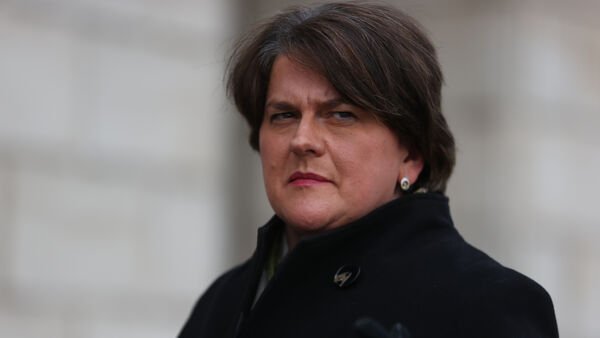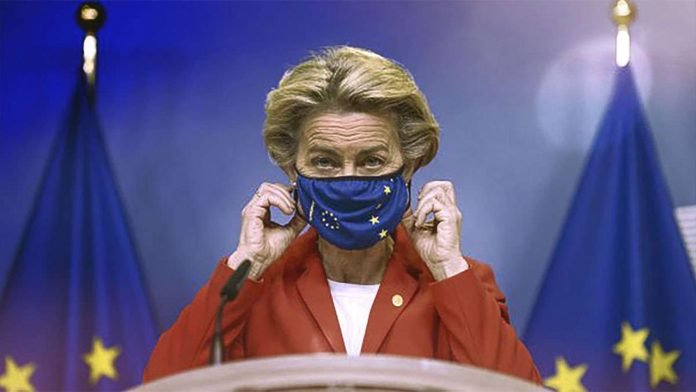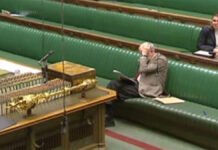The UK says extending a grace period for relaxed rules on goods arriving in Northern Ireland from Great Britain is not a breach.
The EU has formally launched legal action against the UK, alleging that the government has broken international law over Brexit implementation in Northern Ireland.
The European Commission has accused the UK of breaching EU law concerning the movement of goods and pet travel between Great Britain and Northern Ireland after the UK moved to unilaterally change parts of the Brexit deal to better suit British businesses earlier this month.
On 3 March, the UK announced it was going to extend grace periods relaxing procedures and checks on British supermarket suppliers and businesses trading in Northern Ireland until October.
The reality is goods shipped from one part of the UK to another now have to go through border checks.
Under the agreement, to avoid a hard border on the island of Ireland, Northern Ireland has remained a part of the EU’s single market for goods meaning products arriving from the UK mainland have to undergo EU import procedures.
This has created a new trade border with Northern Ireland and the rest of the UK, raising concerns the terms negotiated last year, signed by Boris Johnson, would cause further food shortages if implemented, as agreed, in full at the end of March.
Some supermarkets and other shops have struggled to maintain stocks since 1 January when the arrangement began and the UK says changing the grace period is not a breach and is necessary because the EU has refused to extend it.
The European Commission said this is the second time in six months the UK government “is set to breach international law” after the Internal Market Bill set out clauses that would undercut the Northern Ireland Protocol. These were removed in December.
International Trade Secretary Liz Truss told Sky News earlier this month the easements were “temporary” and it is “perfectly common practice while deals are being implemented to have temporary easements in place”.
“That is not a breach of the protocol and we’re very clear about that,” she added.
Ultimately the action could see a case held at the European court of justice and lead to financial penalties and trade sanctions.
The EU has accused the UK of breaching the good faith provisions in the withdrawal agreement after its unilateral decision two weeks ago to delay implementation of part of the Northern Ireland protocol relating to checks on goods shipped from Great Britain to the region.
UK damaging itself to appease EU, says DUP Leader

DUP leader Arlene Foster is asking for changes to the Northern Ireland protocol as goods from major retailers in the UK are struggling to get through to Northern Ireland.
“There is damage happening to the Belfast Agreement and its successor agreement,” said Foster, adding that “it has also damaged the UK internal market by putting in place a system to protect the EU single market. What we are doing is damaging our own country.”
Meanwhile, DUP Agriculture Minister Edwin Poots has stopped border checks on food coming from the UK into Northern Ireland. “The agriculture minister is looking at all of these issues. He is taking legal advice and speaking to officials as to what needs to be done,” Foster told an Irish radio station over the weekend.
UK Prime Minister Boris Johnson visited Northern Ireland over the weekend to meet with ministers to hear their concerns on trade. Johnson admitted the border is operating in an “imbalanced way” and that he did not envisage certain food items and parcels would be restricted.
Mrs Foster told Times Radio: “The Agriculture Minister (Edwin Poots) is looking at all of these issues.
“He is taking legal advice and speaking to officials as to what needs to be done.”
She said food from Great Britain heading for Northern Ireland, like lasagne, would be marked for sale in sterling so posed no risk of entering the Republic of Ireland where they use euros.
She said the EU was imposing third-party checks, similar to if somewhere like China wanted to send goods into its single market.
The DUP leader added: “It is completely disproportionate to what is necessary.”
The Northern Ireland Assembly will be able to vote on whether to scrap the protocol in 2024.
It’s always one sided when it’s the EU
In February the British government accepted an EU request for extra time to ratify the Brexit trade deal, after Brussels said it needed two more months to scrutinize it in 24 languages.
The UK agreed to the request by the EU to extend the date of its parliament’s ratification of the Brexit trade deal until 30 April.
The trade deal was provisionally approved by the 27 EU ambassadors in December to ensure it came into place on 1 January when the UK left the single market and customs union, removing the prospect of extra friction at the border.
In January the EU Commission invoked an emergency provision — Article 16 of the Protocol on Ireland and Northern Ireland — as part of an export control mechanism that is designed to restrict international shipments of coronavirus vaccines if the EU’s own orders are not being met.
The EU has little compunction about using aggressive tactics and threats to try to get its way – either when dealing with the UK or other states. Over the last year the EU attempted to bully Switzerland into signing up to a new relationship which would increase EU control over the Swiss by abruptly curtailing financial services ‘equivalence’. Creditably, the Swiss retaliated and showed that their financial sector had considerable muscle.
The EU has also exploited African countries, demanding and then abusing rights to fish in their waters in return for economic assistance. The EU’s abortive threat to stop food supplies from Britain to Northern Ireland was another example and the current threat to stop vaccine shipments that could save lives hardly suggests a mature attitude to negotiation.
Ireland says it was not informed by EU about triggering Brexit protocol.
Ireland was not consulted by the European Commission before it briefly sought to restrict some exports of COVID-19 vaccines by invoking an emergency Brexit clause related to Northern Ireland, Ireland’s European Affairs Minister said.
The EU abruptly reversed the plan to use the Article 16 clause to restrict exports of COVID-19 vaccines from crossing the Irish border into the United Kingdom within a matter of hours after it sent shockwaves through Northern Ireland, London and Dublin.
However, the fact the EU had implemented Article 16 was met with outrage across both borders. The EU’s initial decision to trigger a Brexit deal clause to place controls on the export of vaccines sparked criticism on both sides of the Irish border and led to frantic talks including a call between the UK and Ireland to avert a full-scale crisis.
The swift about-face came after Irish Prime Minister Micheál Martin and U.K. Prime Minister Boris Johnson separately phoned Commission President Ursula von der Leyen to express deep concerns. Johnsonand Martin also held a conversation on the issue.
In a tweet late Friday night, von der Leyen said she spoke to Martin “to agree on a satisfactory way to introduce an export mechanism for COVID vaccines.” But that only raised a question of why she hadn’t consulted the Irish leader before the Commission published its export regulations earlier in the day.
EU Com statement tonight confirming NI Protocol Art 16, safeguard clause, will not be triggered.
— Simon Coveney (@simoncoveney) January 29, 2021
Welcome news, but lessons should be learned; the Protocol is not something to be tampered with lightly, it’s an essential, hard won compromise, protecting peace & trade for many. pic.twitter.com/QLKpfhR9Yt
Irish Foreign Minister Simon Coveney welcomed the Commission’s statement but added pointedly that “lessons should be learned; the Protocol is not something to be tampered with lightly, it’s an essential, hard won compromise, protecting peace & trade for many.”
An official in contact with the EU’s chief Brexit negotiator, Michel Barnier, said the EU’s top Brexit experts were not consulted on the decision to trigger the override provision and were stunned to learn about it.
The official suggested von der Leyen and her cabinet were directly responsible.
Support Independent Journalism Today
Our unwavering dedication is to provide you with unbiased news, diverse perspectives, and insightful opinions. We're on a mission to ensure that those in positions of power are held accountable for their actions, but we can't do it alone. Labour Heartlands is primarily funded by me, Paul Knaggs, and by the generous contributions of readers like you. Your donations keep us going and help us uphold the principles of independent journalism. Join us in our quest for truth, transparency, and accountability – donate today and be a part of our mission!
Like everyone else, we're facing challenges, and we need your help to stay online and continue providing crucial journalism. Every contribution, no matter how small, goes a long way in helping us thrive. By becoming one of our donors, you become a vital part of our mission to uncover the truth and uphold the values of democracy.
While we maintain our independence from political affiliations, we stand united against corruption, injustice, and the erosion of free speech, truth, and democracy. We believe in the power of accurate information in a democracy, and we consider facts non-negotiable.
Your support, no matter the amount, can make a significant impact. Together, we can make a difference and continue our journey toward a more informed and just society.
Thank you for supporting Labour Heartlands












